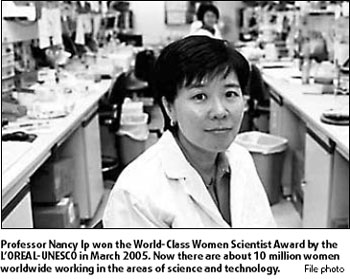Women scientists from the developing world gathered recently in Beijing to discuss at the International Workshop on Women for Science the obstacles and unfair treatment they face in their careers.
There are some factors that unconsciously discriminate against women during their entry and progress in sciences, according to Dr Kaiser Jamil, president of the Third World Organization for Women in Sciences and research director of Indo American Cancer Institute and Research Center.
While women account for more than half of university graduates, only 30 percent of them earn degrees in science and engineering fields. Women account for only 25 to 35 percent of researchers in most developing countries.
"For many girls, the low expectations from parents and teachers for their performance in maths and sciences can result in underachievement and a loss of interest in the sciences," says Jamil.
There prevails the presumption for women that they cannot or do not spend as much time in their work places as their male colleagues do and are automatically regarded as less dedicated to their scientific careers.
Women researchers tend to be concentrated in certain fields such as biology, health, agriculture or pharmaceuticals, but with low representation in physics, computing and engineering, Jamil says.
According to her, the gender gap in science has been reported to be the greatest in Japan, South Korea, Austria and Switzerland.
There is a great increase in the number of women engaged in science in China during the past decade. Now there are about 10 million women worldwide working in the areas of science and technology, accounting for one third of the total science workers, according to Zhao Lanxiang, a research fellow from the Institute of Policy and Management of Chinese Academy of Sciences.
According to a survey of female academics, researchers and postgraduate students conducted between 2005 and 2006, the most attractive factor for women choosing science is that they regard it as a stable career.
The survey found 94 percent of respondents said they had met various obstacles when engaging in science. For example, if the applicants have similar education backgrounds, the agencies tend to choose the male. Some organizations even state clearly that they only want to recruit male candidates.
During their careers, many female scientists have to undertake double roles as conventionally women are considered responsible for household chores and raising children. About 78 percent of the respondents said they took care of the bulk of domestic duties in their families.
Also the survey found that female scientists in their 30s encountered more problems as they tend to be less ambitious as they get older.
Wu Ling'an from the Institute of Physics with Chinese Academy of Sciences notices that the number of female scientists in her institute is going down. She was particularly unsatisfied with the compulsory retirement age for women at 55, five years earlier than men. "Unfortunately, I lost the battle in my institute against this unfair policy," she says.
In recent years, there has been an increase in the ratio of female graduate students enrolling in physics, even reaching 40 percent in some instances. However, Wu believes that the reasons for these phenomena are rather contentious: Women often perform better than their male competitors in entrance examinations and also they have to attain higher degrees in order to gain employment.
"The choice of role models is largely linked with gender and is very important in influencing change of gender impact. So we need to encourage the nomination of women to top senior positions so as to increase the number of role models for younger women," says Jamil.
Among all 773 Nobel laureates, there are only 34 female scientists.
"I believe it is not the correct figure to show women's contributions to science, because lots of women have done hard work but do not reach the senior position to win the prize," she says.
(China Daily September 10, 2007)


